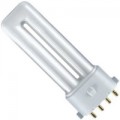Luminous flux (brightness)
The conditional "amount of light" produced by a light bulb in normal mode. The higher the luminous flux, the brighter the light and the more clearly the illuminated scene will be visible. Note that lumen values are used primarily for special purposes; in everyday life, the estimation of brightness by the analogue of LON is more popular (see above), and here the ratio is as follows:
— 40 W analogue LON corresponds to a brightness of 370 lm;
— 60 W — 550 lm;
— 75 W — 800 lm;
— 100 W — 1200 lm;
— 150 W — 1900 lm;
— 200 W — 2700 lm.
Note that the principle "the more the better" in the case of the brightness of light bulbs is not always applicable. And the point here is not only energy consumption: too bright light is harmful to the eyes, leads to rapid fatigue and psychological discomfort.
Colour temperature
This parameter describes the general coloration of the light of the lamp in "warm" or "cold" tones.
Initially, colour temperature is the temperature (in kelvins) of an object at which it begins to glow in a certain colour. Interestingly, the higher its value, the more “cold” the colour is: for example, the dull red glow of a heated metal corresponds to 800-1000 K, and the bluish-white tint of a fluorescent lamp corresponds to about 6000 K.
The temperatures encountered in modern light bulbs can be described approximately as follows:
2700 – 3000 K — "warm" white light, similar to traditional incandescent lamps;
3000 – 3500 K — "slightly warmer than average";
3500 – 6000 K — neutral white, similar to daylight;
More than 6000 K — cold shades of white.
Note that the colour temperature is not directly related to the quality of colour reproduction provided by the light of a particular lamp — much depends on the features of its design and, accordingly, the spectral colour balance.
Claimed running time
The service life of the light source claimed by the manufacturer is implied, during which the illuminator is able to generate the claimed brightness and temperature colour spectrum. It is believed that light-emitting diode (LED) bulbs have the longest service life — their working life can be 10,000 — 50,000 hours (
50 years of operation), depending on the modification of the bulb. But this parameter cannot be regarded as a guarantee, since
a lamp with an operating time of 25 years can work less, and maybe even more, than
a lamp with a "life" of 30 or even
35 years. In second place are energy-saving fluorescent light bulbs that are capable of generating daylight — the service life of such is in the range of 2000 — 20,000 hours. The average service life of halogen bulbs is about 2000 — 4000 hours, but when the power supply is equipped with a soft start device, it can be almost doubled. In last place are classic incandescent bulbs, the service life of which is within 1000 hours.

